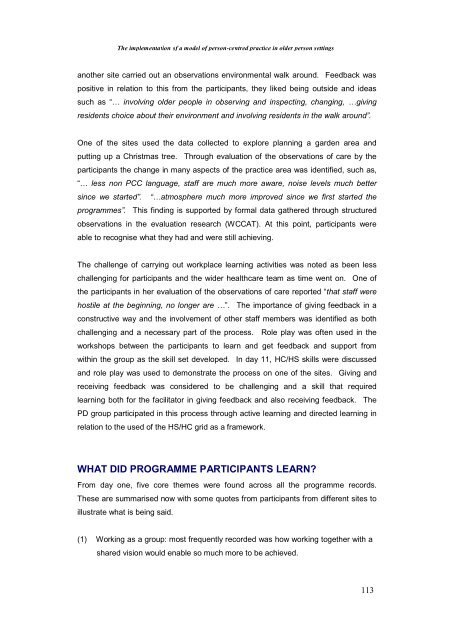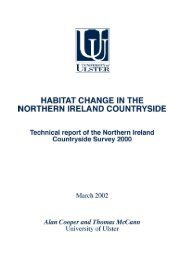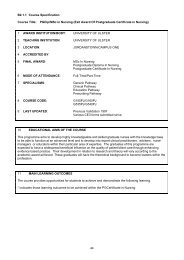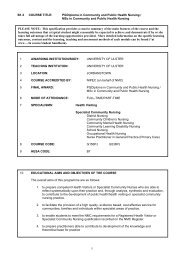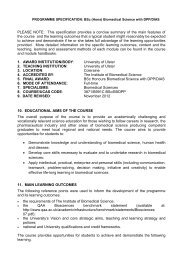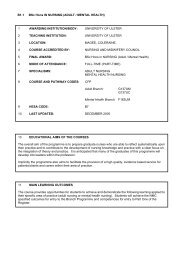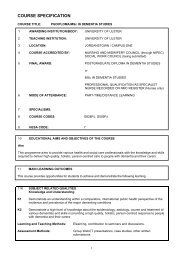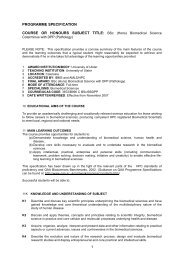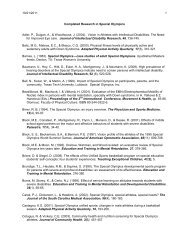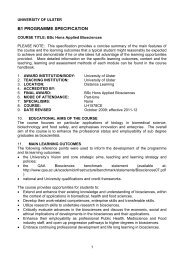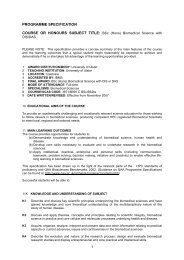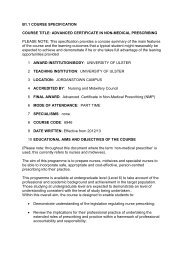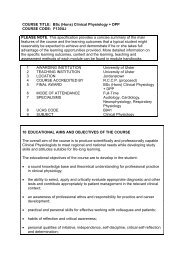The Implementation of a Model of Person-Centred Practice In Older ...
The Implementation of a Model of Person-Centred Practice In Older ...
The Implementation of a Model of Person-Centred Practice In Older ...
Create successful ePaper yourself
Turn your PDF publications into a flip-book with our unique Google optimized e-Paper software.
<strong>The</strong> implementation <strong>of</strong> a model <strong>of</strong> person-centred practice in older person settings<br />
another site carried out an observations environmental walk around. Feedback was<br />
positive in relation to this from the participants, they liked being outside and ideas<br />
such as “… involving older people in observing and inspecting, changing, …giving<br />
residents choice about their environment and involving residents in the walk around”.<br />
One <strong>of</strong> the sites used the data collected to explore planning a garden area and<br />
putting up a Christmas tree. Through evaluation <strong>of</strong> the observations <strong>of</strong> care by the<br />
participants the change in many aspects <strong>of</strong> the practice area was identified, such as,<br />
“… less non PCC language, staff are much more aware, noise levels much better<br />
since we started”. “…atmosphere much more improved since we first started the<br />
programmes”. This finding is supported by formal data gathered through structured<br />
observations in the evaluation research (WCCAT). At this point, participants were<br />
able to recognise what they had and were still achieving.<br />
<strong>The</strong> challenge <strong>of</strong> carrying out workplace learning activities was noted as been less<br />
challenging for participants and the wider healthcare team as time went on. One <strong>of</strong><br />
the participants in her evaluation <strong>of</strong> the observations <strong>of</strong> care reported “that staff were<br />
hostile at the beginning, no longer are …”. <strong>The</strong> importance <strong>of</strong> giving feedback in a<br />
constructive way and the involvement <strong>of</strong> other staff members was identified as both<br />
challenging and a necessary part <strong>of</strong> the process. Role play was <strong>of</strong>ten used in the<br />
workshops between the participants to learn and get feedback and support from<br />
within the group as the skill set developed. <strong>In</strong> day 11, HC/HS skills were discussed<br />
and role play was used to demonstrate the process on one <strong>of</strong> the sites. Giving and<br />
receiving feedback was considered to be challenging and a skill that required<br />
learning both for the facilitator in giving feedback and also receiving feedback. <strong>The</strong><br />
PD group participated in this process through active learning and directed learning in<br />
relation to the used <strong>of</strong> the HS/HC grid as a framework.<br />
WHAT DID PROGRAMME PARTICIPANTS LEARN?<br />
From day one, five core themes were found across all the programme records.<br />
<strong>The</strong>se are summarised now with some quotes from participants from different sites to<br />
illustrate what is being said.<br />
(1) Working as a group: most frequently recorded was how working together with a<br />
shared vision would enable so much more to be achieved.<br />
113


